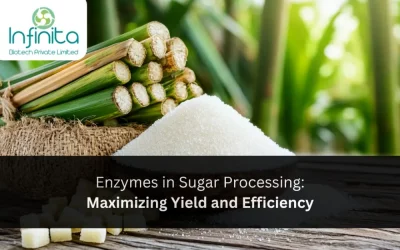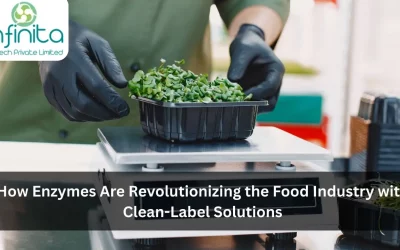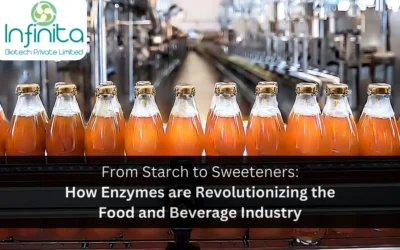Introduction
Microbial enzymes have transformed the food industry by enhancing food processing, improving texture, and increasing shelf life. Derived from bacteria, fungi, and yeast, these enzymes are widely used for their efficiency, cost-effectiveness, and ability to replace chemical additives.
From baking to dairy and beverage production, microbial enzymes play a crucial role in food innovation. In this blog, we explore what microbial enzymes are, their benefits, and their key applications in the food industry.
What Are Microbial Enzymes?
Microbial enzymes are biocatalysts produced by microorganisms such as Aspergillus, Bacillus, and Saccharomyces species. These enzymes speed up biochemical reactions without altering the final product.
Common microbial enzymes used in food processing include:
- Amylases – Break down starch into simple sugars
- Proteases – Hydrolyze proteins into peptides and amino acids
- Lipases – Aid in fat breakdown and flavor enhancement
- Cellulases – Degrade plant fibers for better texture
- Lactases – Help digest lactose in dairy products
Applications of Microbial Enzymes in the Food Industry
1. Dairy Industry
Microbial enzymes are extensively used in dairy processing to improve texture, flavor, and digestibility.
✅ Rennet substitutes (Microbial proteases) are used in cheese-making for milk coagulation
✅ Lactase helps break down lactose in milk for lactose-intolerant consumers
✅ Lipases enhance cheese ripening and flavor development
2. Baking Industry
Enzymes improve dough texture, increase softness, and enhance bread quality.
✅ Amylases break down starch into sugars, boosting fermentation
✅ Proteases improve dough elasticity and gluten modification
✅ Xylanases enhance bread volume and crumb texture
3. Brewing and Beverage Industry
Microbial enzymes play a crucial role in brewing, wine-making, and juice processing.
✅ Amylases and glucoamylases convert starch into fermentable sugars in beer and spirits
✅ Pectinases clarify fruit juices and improve yield
✅ Cellulases help extract flavors from plant-based beverages
4. Meat and Protein Processing
Proteolytic enzymes help tenderize meat and improve protein-based food products.
✅ Proteases break down tough muscle fibers for tender meat
✅ Transglutaminases enhance texture and binding in processed meats
✅ Lipases improve fat distribution for better taste
5. Sugar and Sweetener Production
Microbial enzymes help produce high-quality sweeteners and sugar alternatives.
✅ Invertase converts sucrose into glucose and fructose for syrups
✅ Glucose isomerase is used in high-fructose corn syrup (HFCS) production
✅ Amylases aid in the conversion of starch into maltose and glucose
6. Fermented Foods and Probiotics
Fermentation relies on microbial enzymes to develop flavors, preserve food, and enhance nutrition.
✅ Used in yogurt, kimchi, pickles, and soy sauce production
✅ Lipases and proteases improve taste and aroma in fermented foods
✅ Microbial lactase and probiotics aid in gut health
Conclusion
Microbial enzymes have revolutionized food production by enhancing efficiency, sustainability, and quality. Their ability to replace chemical additives makes them a natural and eco-friendly alternative for food processing.
As technology advances, the use of microbial enzymes is expected to expand further, shaping the future of healthy, sustainable, and high-quality food products.







